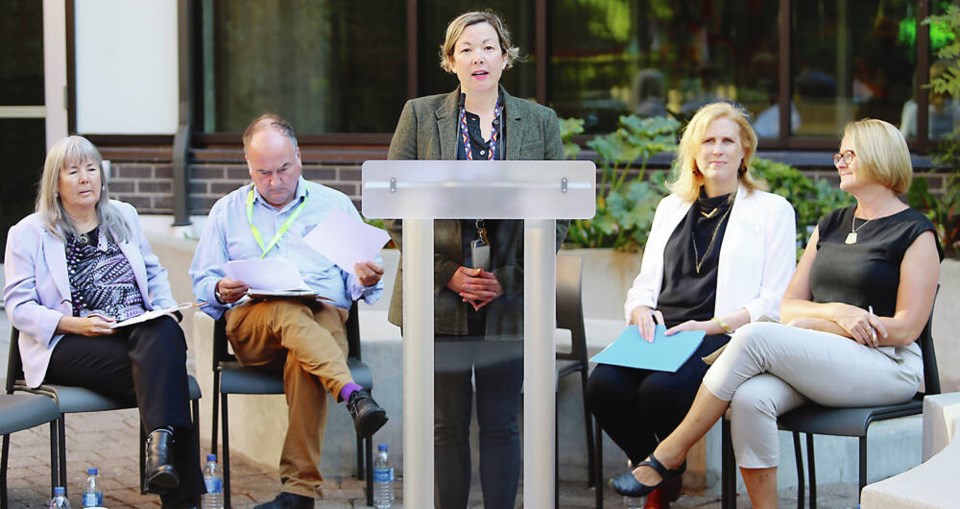A group of Vancouver Island non-profit organizations is calling on local governments — including candidates in upcoming municipal elections — to take steps to ease the way for more affordable and supportive housing units.
“We’re calling on all candidates for municipal office to consider these calls to action in their platforms, and all voters to press their candidates to endorse these actions,” Carolina Ibarra, chief executive of Pacifica Housing, said Thursday.
The 14-member coalition is pitching ideas to municipalities on how to limit costs in order to support social housing units.
Recommendations include having housing centres in each municipality, local governments donating land, cutting red tape and speeding up approval processes.
Kathy Stinson, chief executive of the Victoria Cool Aid Society, said the most visible symptom of the shortage of affordable housing is the growing number of people “cycling in and out of homelessness,” living in shelters or on the streets, struggling with substance abuse and mental illness.
“Individuals languish in shelters and transitional housing due to insufficient supportive and affordable housing, which holds individuals back and drives up overall costs and contributes to the crisis,” she said at a media event at Camas Gardens, Pacifica Housing’s subsidized housing facility on Humboldt Street.
Shelters see the same people cycling through for months or even years, she said.
Even though units are being built, more are needed, said Virginia Holden, executive director of the Greater Victoria Housing Society. “We are digging ourselves out of 30 years of lack of government funding for affordable housing and lack of supply especially in the rental housing market.”
Non-profits wanting to add more housing say they face some of the same challenges as private developers: rising inflation, higher material costs and a shortage of labour.
Even with provincial and federal financial support, a society carries mortgage debt for a new project, said Corinne Saad, executive director of the Gorge View Society.
Rising interest rates, higher construction costs and long delays in obtaining approvals all boost a project’s cost, which translates into higher rents, Saad said.
“Affordable rents is what we are about as mission-driven organizations. Our goal is to keep the rents as low as possible.”
Housing centres within municipalities would help get affordable housing projects through in a timely way, and “time is money,” Saad said.
Julian Daly, chief executive of Our Place, pointed to the many tents on Pandora Avenue, saying: “Those tents for many citizens represent an eyesore in a beautiful city, but for those people [in the tents] that is their affordable housing.”
Many have mental-health and addiction challenges and are not getting supports they require, he said. “They are unattended to and it is a living example in front of us all every day of our failure to deliver those right supports to those that need them, when they need them.”
Municipalities, agencies and senior governments could work together on determining the most effective models of social housing and supports, he said, adding that when the societies work with municipalities, “We can more effectively advocate at the provincial and federal levels” for housing.
The non-profit groups issued a six-part call to action to local governments, urging them to:
• Set up a housing centre in each municipality to facilitate and speed up approvals for social housing. These centres would encourage departments to consider social housing in their decisions and policies.
• Provide land for social housing.
• Exempt non-profit projects from property taxes, development cost charges and municipal improvement costs.
• Accelerate the approval process for social-housing projects that meet goals of official community plans.
• Promote collaboration among non-profits, local governments and health authorities to provide support to people in crisis when they need it.
• Use the expertise within these societies as a resource.



